Last 25th and 26th February the FPSC held two meetings at the Hotel NH Giustiniano in Rome.
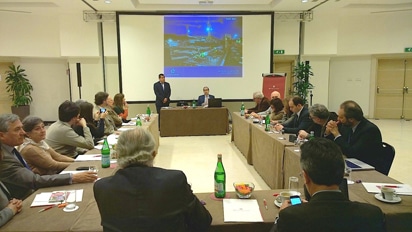 On the 25th, in the framework of the Forum on Latin America, which regularly organize a meeting with diplomats and journalists to discuss current issues on the South American continent, the FPSC organized the breakfast meeting “The future of the Panama Canal: the challenge of reinventing oneself”.
On the 25th, in the framework of the Forum on Latin America, which regularly organize a meeting with diplomats and journalists to discuss current issues on the South American continent, the FPSC organized the breakfast meeting “The future of the Panama Canal: the challenge of reinventing oneself”.
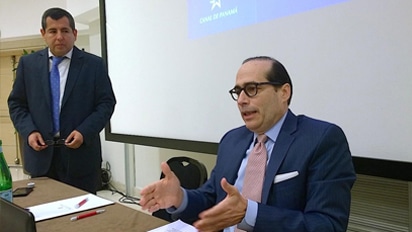 We counted as a keynote speaker with Ambassador of the Republic of Panama in Italy, D. Fernando Berguido Guizado, which provided details on extending the Interoceanic Canal and stressed that one of the main contributions of this work is to reduce the level of poverty in the country.
We counted as a keynote speaker with Ambassador of the Republic of Panama in Italy, D. Fernando Berguido Guizado, which provided details on extending the Interoceanic Canal and stressed that one of the main contributions of this work is to reduce the level of poverty in the country.
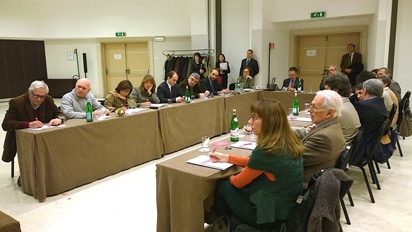 Since 2000, resources from the Panama Canal belong to Panama and the Panama Canal Authority (ACP), an autonomous body responsible for managing the passage with neutrality status. Currently, this means an income of between 1,200 and 1,400 million annually. As a result, the country has experienced a significant reduction in poverty, up to 35%, because of the money collected by the Canal is allocate “by law” to a welfare fund.
Since 2000, resources from the Panama Canal belong to Panama and the Panama Canal Authority (ACP), an autonomous body responsible for managing the passage with neutrality status. Currently, this means an income of between 1,200 and 1,400 million annually. As a result, the country has experienced a significant reduction in poverty, up to 35%, because of the money collected by the Canal is allocate “by law” to a welfare fund.
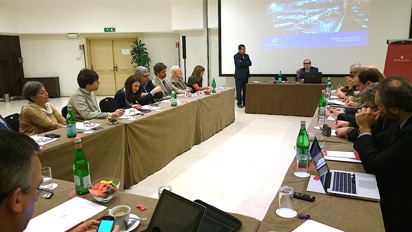 The expansion of the Panama Canal, which performs the international consortium Grupo Unidos por el Canal (GUPC) and is expected to be completed in the spring of 2016, will bring increased revenue to the isthmus, due to more expensive tolls and higher forecast influx, as they may circulate higher tonnage ships. Therefore, expectations are optimistic about meeting the objectives of the Latin America and Caribbean without Hunger 2025 initiative, which is part of the third target of the first Millennium Development Goal.
The expansion of the Panama Canal, which performs the international consortium Grupo Unidos por el Canal (GUPC) and is expected to be completed in the spring of 2016, will bring increased revenue to the isthmus, due to more expensive tolls and higher forecast influx, as they may circulate higher tonnage ships. Therefore, expectations are optimistic about meeting the objectives of the Latin America and Caribbean without Hunger 2025 initiative, which is part of the third target of the first Millennium Development Goal.
The diplomat also recognizes some negatives about the Canal, as is the focus of corruption that is currently investigating, derived from surplus of resources derivatives thereof, and the construction of a new channel that the HKND Chinese Company plans to open in nearby Nicaragua in late 2019.
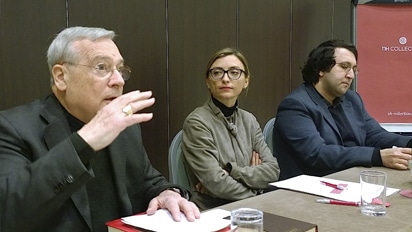
A day later, on 26 February, the Center for Middle Eastern Studies FPSC (CEMOFPSC) organized the meeting “Dialogue and freedom of religion, fifty years after Nostra Aetate”.
The participants were Msgr. Agostino Marchetto, Secretary Emeritus of the Pontifical Council for Pastoral Care of Migrants and Itinerant People, and Mustafa Aydin Cenap, Director of the Institute Tevere.
Among the statements Archbishop Marchetto stressed that with Vatican II, the Church recognizes the right of the human person to religious freedom, and this makes the difference with the past: it is not the Truth that has rights, but the human person; therefore his duty and responsibility is to seek the truth conscientiously.
He also acknowledged that Vatican II “Nostra Aetate and Dignitatis Humanae” has generated new ideas, efforts and initiatives; but its implementation requires time and effort.
For the protection of minorities, it would help create greater secularization; and that Muslims adopt statements and positions against fundamentalism.
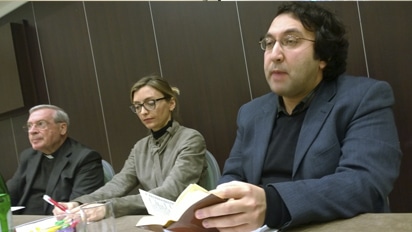
Aydi for its part said “Notra Aetate” is an important document for reconciliation: Christians and Muslims must work together and communicate for the good of all men.
He also highlighted the fact that in the Quran there is no compulsion in religion. Fundamentalism is an external reality to the nature of religion. The Islamic State (Caliphate) is not Islam, since Quran does not impose a form of state.
He also drew attention in that in Europe, Islam is not protected; makeshift mosques were erected in places like garages and basements; and anyone can be declared Imam, which in Muslim countries this is not possible.
Finally he remembered that terrorism is mainly against Muslims: ISIS claims more victims among Muslims, although in Europe it is spoken rightly so of the persecution of Christians.

